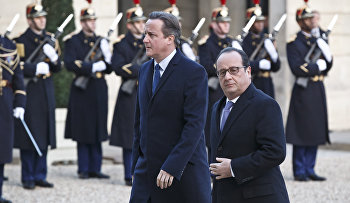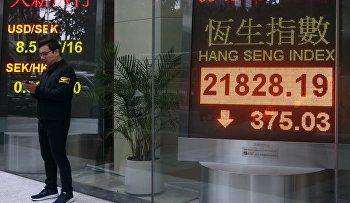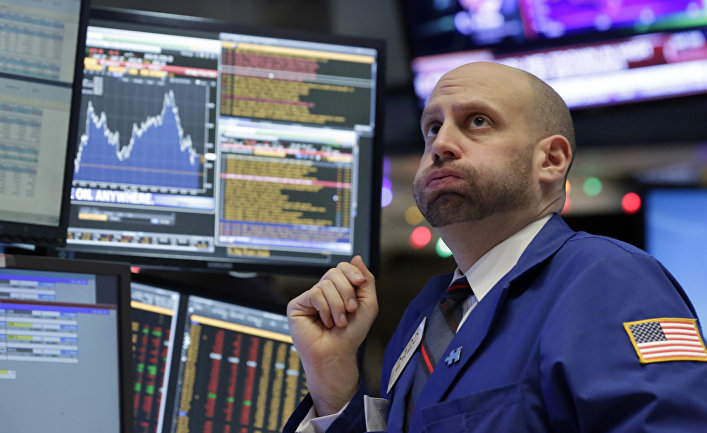Traditionally major investment and finance corporations made their predictions on the eve of the New Year about how they believe the situation will unfold. HSBC has just published its own study, in which it presents the main risks to which it believes the world economy is currently prone.
Their report presents two forecasts for what HSBC considers 'good' risks – the reestablishment of capital investment in the USA, and the inflow of capital into the American economy. But there are also six examples of 'bad' risks – which include paralysis in monetary policy; a steep rise in oil prices; the possible 'Brexit' in which the UK might leave the EU; political crises on the European periphery; more frequent stock exchange crashes; and a heightened number of corporate defaults in PR China. There are two 'monstrous' risks, too – recession in the USA, and mistaken monetary policy in the US Federal Reserve.
1. Paralysis in monetary policy
Changes in percentage rates in the USA and Europe since 2014.
The monetary authorities of the largest world economies have either no desire, or are actually unable to bring in new policies to stimulate economic growth. There are practically no viable alternatives left — and those few that remain have already demonstrated their dismal potential. Quantitative easing, negative interest rates, fiscal policy – it's all been tried. The investment implications in this situation are — falling profitability rates, increased credit spreads, and tumbling share prices – especially in emerging markets.
2. Increased oil prices caused by changes in the supply situation
Following on falls in oil prices by 60% since mid-2014, the market seems obsessed with the risk of further drops. However, investors need a different viewpoint – to face the very real risk of sharp rises in oil prices, which are very probable when extraction volumes tumble in the USA from 2016 onwards. OPEC's surplus capacity may not cover the gap in demand, so other oil-producing nations can now press on with extracting as much as they can. Catching up with capacity could take more than a year — leading to oil shortages and high prices. In 2016 alone, HSBC predicts, US oil production may drop by 650,000 barrels per day.
#OilPrices just hit a 7 year low. F&D magazine predicts how long low oil prices are likely to last https://t.co/y5c1Fv7ZJM
— IMF (@IMFNews) December 11, 2015
The investment implications of this scenario would be highly positive for the US dollar; high yields for debt markets; strongly positive for oil exporting nations and their currencies; and the five-year Saudi Arabian CDS will grow cheaper. Saudi and Russian stock markets stand to do best from this situation.
3. Brexit – the UK's possible exit from the European Union
British PM David Cameron has said previously that a referendum will be held by the end of 2017 at latest – but it now seems likely that it will be held during 2016. The uncertainties swirling around the country's possible exit from the EU may carry on for some time, resulting in a period of pressure on investment and economic growth. However, many corporations may relocate themselves outside Britain, in order to enjoy full access to EU markets.
The investment implications – the pound will be selling sharply, the FTSE-100 Index will take a tumble, based on the high proportion of overseas revenue earnings which British companies have – plus the chance that 'contamination' from separatist feelings might prompt debt difficulties on the EU's periphery.
4. Political crises in countries on the European periphery

A mixture of economic, political and social problems will once again provoke the question of certain countries wanting to exit from the Euro-zone. The effect on other markets will be quite severe – certainly no less than during the Euro-zone crisis of 2011. If the Portuguese elections come off with no result, the government will inherit a raft of serious difficulties – notably in implementing key reforms in the pension system and in labour markets. Reforms are going too slowly in Greece, but they suit Greece's creditors. The investment implications are that yield spreads in debt securities will broaden in countries on the Euro-zone margins; European stocks will fall, and investors will be selling Euros.
5. Stock market crashes, resulting from technical problems
Automated high-frequency trading has become a major issue for trading platforms. They simply don't have enough time to process the huge amount of information. Market breakdowns may reach as much as 10% in result. Traders are making huge announcements, implementing stops, and so on. HSBC expects that the impact of market breakdowns will become only more serious. It will affect the cost of borrowing from banks, and lead to further downturns in the liquidity of markets. The investment implications are: increased market dip volatility, bonds tending to outperform stocks during such dips, and two-year US Treasury Bonds will take a drop.
Dow falls 300 points as oil prices continue to slide. Crude drops to $35.59 a barrel. https://t.co/bL1G2muGpS
— CNN Breaking News (@cnnbrk) December 11, 2015
6. Corporate defaults in China
There is now a heightened risk of corporate default in many sectors of the PR China economy. HSBC estimates that around 30 bond issuers may go broke in the first half of 2016, unless they receive support to stay afloat. This means that 30% of all defaults are likely in April. The majority of them are companies in the coal and steel sectors. Investment implications: Chinese stocks and bonds are just waiting for the drop; political action by Beijing may cushion the blow; the Yuan will not have a stable rise.

7. Recession in the United States
The ongoing resurgence of the dollar is the main contributing factor to a reduction in corporate profit, weakened demand for exports, and increased import competition in the USA. Feeble growth worldwide will exacerbate the position of net exports in the USA. Even if interest rates fall, businesses will hold off from any new rounds of investment. The investment implications: the US dollar and US Treasury Bonds will take a dive; industrial sectors such as the manufacture of raw materials and energy are likely to be under heavy pressure. Brazil, Russia, S Africa, Turkey, and Mexico will be looking at big losses. Emerging markets will have adjusted towards the idea of a hike in rates at the year-end – but they may not be able to take a further tightening.
8. Mistaken monetary policy in the US Federal Reserve.
The Fed could step up the pace of restrictive policies if prices in the country continue to rise. This will heighten the pressure on the economy. Rising interest rates would slow the growth of overall demand more than had been expected. As a result, the Fed would become even more aggressive when responding to inflation – in other words, tightening policy still further. If this were to happen, economic activity would shrink very rapidly, producing increased volatility in the financial markets. The investment implications: overall 'deflation of assets'; bonds and stocks will begin selling; the dollar may firm up, and shares in Brazil, Columbia, South Africa, Mexico and Turkey will drop in price rapidly and dramatically.
Without a doubt, the most 'interesting' point made in the above paragraphs is the mention of a rise in oil prices. The probability of a oil-price rise certainly exists, but it won't happen before the end of the first quarter of 2016 – says Robert Novak, Senior MFX Broker Analytic Advisor, head of the Analysis department at MFX Capital. Even if it's a cold winter, the small increase in demand will not be enough to consume the supply surplus currently found on world markets (almost two million barrels per day).
Even so, Novak continues, maintaining the present ultra-low prices for oil is likely to have a very negative impact on the oil industry in the upcoming quarters, as well as severely reduced investment levels in the petro-chemical industries, notably in shale-based and hard-to-extract resources. The decline of investment in this type of project exceeded 30% in 2015 alone – or around $140 billion dollars. In 2016 the gap is set to worsen, to $250 billion dollars. Of course, this kind of slowdown in oil production investment cannot have any effect on the actual amounts of recoverable petrochemical reserves. This would eventually reduce the overall global extraction figures to correct the imbalance in supply and demand figures globally – and promote an increase in prices.
Oil prices drop for seventh session on oversupply worries https://t.co/6C5md4MAPr pic.twitter.com/KuV3ON72WV
— Reuters Top News (@Reuters) December 14, 2015
If we take a look at the bigger picture of overall risks to the economy and markets for 2016, then independent analyst Dmitry Adamidov suggests that alongside the risks listed in the article, there is a further point to ponder. Today we see the erosion and self-destruction of a great many international economic institutions. In a formal sense, at least, the WTO and the IMF are still with us – but the essence of their work is increasingly irreconcilable with their ostensible objectives.
Adamidov believes this is evidence that the world economy is sinking ever steadily into managed chaos – and sooner or later will turn into some kind of trade war, or stock or debt crisis. In the bigger picture, even the very minimal opportunities that were available to the international community several years ago have today lost their traction — or have even been dismantled.






